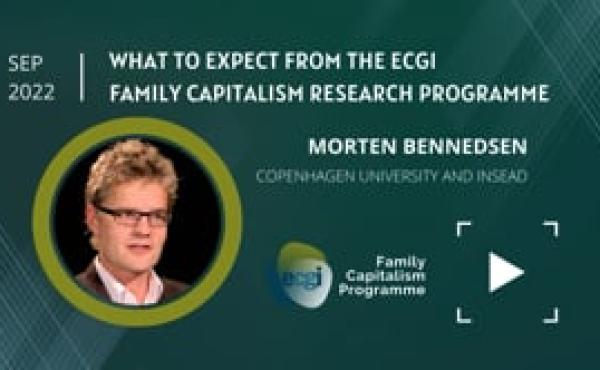Family Capitalism
A pillar of the ECGI Responsible Capitalism Initiative.

Families in business naturally engage in global challenges because they think in generations. To be change makers, a family in business must develop institutions that secure both the family’s and the business’ engagement and accountability in environmental, social and governance issues.
Professor Morten Bennedsen (September 2022)
Can family firms be a force for good in a world with increasing global challenges, where global competition makes business more powerful and undermines the social stability of societies? Family firms have a unique potential for being change makers through exercising long-term business strategies, value-based leadership models and engage in philanthropy and impact investment. However, the lack of checks and balances, the dependence on key individuals’ incentives to engage in broader issues and the ability to engage in global tax avoidance in reality may reduce the actual role of business families as a force for good.
Family business founders want to build legacies for the coming generations. In addition, long living families often foster loyalty. Often it starts with loyalty towards the founder’s ideas and products and extend to the employees that have made the founders ideas possible. Since the firm often stay in the place it was created loyalty includes the local community including the families of the employees, the development of the city or region and contributing to solving social and educational challenges or support regional development in general. As families and businesses grow this loyalty may include a broader part of the society and can often be extended to the entire country of origin.
Family business leadership is value based. Research has shown that owner-managers often have strong values. Values that are visible in family leaders and spread though other family members and often long into the business they run. Studies have also verified that businesses with more family involvement on average have more value driven leadership and such values are correlated positively with honesty, strategy implementation and indeed profit. Thus, value-based family business seems to be in a strong position to be responsible to a larger group of stakeholders which include employees, communities and beyond. Interesting though, values-based leadership is NOT on average correlated with being more responsible to nature.
An increasing dependence on philanthropy and impact investment from businesses and families do however raise some broader questions: First, it highlights that businesses are getting stronger and democratic governments are getting weaker. Will there be a democratic problem if social, educational and environmental policies to an ever-larger extent if executed by private firms and families in business? Second, the world is becoming smaller and the ability to move financial wealth around the globe has never been larger. From the many tax paper revelations, we have seen that families in businesses often are very aggressive in minimizing their taxes. Is there a paradox in families aggressively minimizing their corporate, income and other taxes, while at the same time donate ever more money to the solve some of the challenges that governments lack resources for?
ECGI Family Capitalism Pillar
Leadership Team
Programme aims and objectives
October 2022
Overview
Family-controlled firms are ubiquitous, both among publicly listed and privately owned entities. They are essential for the future of capitalism and their role merits reflection and debate.
Research Questions
- Do family firms have sufficient access to capital markets?
- Are family firms committed to sustainability?
- Is the family firm model sufficiently understood by institutional investors?
- Are changes ahead in the priorities and actions of family businesses and ESG?



